If you’re joining us just now, follow the snake’s tail to the Prologue or climb a ladder to the Table of Contents.
Chapter 5: The Merchant-Farmer
Madame Blavatsky had decided to participate in the RPG that Evan, Levi, Gordon, and Niyati had been playing on the Astral Plane. She clenched her black-gloved fist and kissed it for good luck. Then she cast three four-sided dice onto the playing board as the three pyramids of Giza crashed down onto the ochrous surface of the desert planet of Satcitananda.
“Man fears time,” Niyati said. “And time fears the Pyramids.”
The four players materialized in a misty ball of light on the planet’s surface. They wore ragged black robes, a vain attempt to blend in with the native populace. The triple face of Brahma, backlit against a stark moon, turned slowly on its axis in the sky, casting long shadows across the wind-whipped land. The Satcitanandans crowded around the newcomers, lifting their arms slowly and wriggling their fingers.
The starship’s away team felt a heavy force tugging at them. The Satcitanandans had cast a spell: a wall of temporal retrogression, which threw the players backwards in time to that instant just before the moment they arrived.
“I thought you were the game master,” Evan told Niyati as he tried to focus his mind which was becoming cloudy.
Niyati wore the uniform of a science officer under her ill-fitting robes. “I told you aboard the ship,” she said. “That it’s your move.”
“No,” Evan said, looking sidelong at her with a grin. “You told me ‘it’s your move’ then, but you’re about to tell me again.”
She smiled archly. “It’s your move, Evan.”
And then countless human faces on the faces of countless faceless clocks opened their mouths and laughed in unison with the canned laughter, for the heroes of the RPG were still the stars of America’s favorite sitcom. Startled by this unexpected outburst of hilarity, the Satcitanandans became frozen in time, which was peculiar since they embodied the very thing they were frozen into—as if some precambrian insect had expectorated the amber it was encased in.
—And that was when everything changed. Gordon had fled back to the starship and was now driving it like a bat out of hell, because all of this talk about time had reminded him that he was running out of it.
He would die two days after Evan and Niyati were married. He attended the wedding. Everyone loved his larger-than-life personality, and they laughed kindly at the shabby powder-blue tux he wore. (He couldn’t afford a nice one.) He danced with Evan’s sister, Julie. “He made me feel like a million bucks,” she said.
Gordon hoisted the groom in the air and put him on his shoulders. Evan downed his fourth whiskey. He was sweating and wide-eyed and this made Gordon sad, because he knew his pal had a problem.
—It was rather subtle the way the Satcitanandans started to move again, as the three remaining players stood stock still on the planet’s surface utterly mystified by Gordon’s erratic behavior. The blue-skinned sentient moments of Absolute Time began a strange interpretive dance, projecting directly into the away team’s mind these events that were to happen in the future.
Gordon died while Niyati and Evan were on their honeymoon. A drunk driver lost control of his vehicle while speeding down Ventura Highway. The car swerved and crashed into Gordon’s parked flower-power van. The cops arrived. The drunk driver was fine. But Gordon lay supine on the shoulder of the road amid the vegetables he’d been selling with an astonished look on his face.
The cops searched for a wallet or a driver’s license, but there was none. They looked in the glove compartment of the van, but all they found there was a beat-up copy of the Bhagavad Gita. The reason Gordon had no ID or other documentation was because he loathed the bullshit of officialdom with its endless paperwork. The van’s tags were expired and the license plate belonged to an extinct pickup from Omaha that had been junked over a decade prior. Gordon had covered the tags with gunk so it looked like it just needed a good wash. After all, the cops, too, hated officialdom’s paperwork, so they tended to turn a blind eye to homeless rule-breakers like Gordon.
Gordon ran away from home at the age of thirteen because his dad, who was a nice guy but a nasty drunk, beat him, and his mom, the school nurse, let daddy do it, thinking it wasn’t a big deal: “It’s part of growing up. Boys need to be thick-skinned so they can face the harsh realities of the world.”
So Gordon left his home in Arizona, a skinny teenager, and found a new home in the world at large. And like “this little piggy” Gordon ran wee, wee, wee all the way to this home—a home full of the harsh realities mom had told her friends about, the realities Gordon’s dad was toughening his son up to face, a world crackling with canned laughter and replete with coarse ways, where no respite was to be had. And the boy met more adults who abused him in ways that outdid anything his dad had ever done to him. And these adults too didn’t think it was a big deal to toughen up the teenager: “He’s already a man,” they said. “He needs to act like one.”
Gordon played the complicated RPGs with their shifting rules and hidden goalposts. And he sometimes slept in the alleys and sometimes in the boxcars, but often the only place he could find was a dim-lit drug-den haunted by the trembling phantoms of absolute despair. He survived as a hustler in Vegas, selling his body for food and shelter, or letting others sell his body for him. “You’ll soon learn, kid, that everyone gets a cut,” the pinstriped pimp told him as he dropped him off (half doped, half drunk, half clothed) at the priest’s back door.
But all the while Gordon swore he’d never let the monsters make a monster of him. When it all became too unbearable, Gordon fled to the anonymity of the encampments, where he hid with the other unloved NPCs. And for days on end, he’d stop eating, stop drinking, stop thinking, pass out and hope that this was it; but then he would wake up, because a social worker had nursed him back to health and Gordon would ask why they hadn’t let him die: “Because,” they’d say, “the world’s a better place with you in it.”—And one time Gordon could tell that the social worker meant it.
On rare occasions Gordon won a turn of the grating roulette wheel whose iron spokes counter-spun with uncaring relentlessness, the grinding millstone of Fate. And someone would yell “Jackpot!” and in the shower-fall of fool’s gold and worthless coin, Gordon would shuffle to the next square on the Snakes and Ladders board amid the jealous taunts and envious jeers of the dead-eyed disillusioned.
He was too proud to go home, even though he wanted to go home more than anything else in the world.
Eventually he eked out a living on the outskirts of LA as best he could by raising vegetables in a few plots of land near Ventura Highway. And he forged strategic alliances with the least abusive of his abusers. Then one day he was all grown up and his frame broadened and he grew a long beard, and the abusers stopped abusing him because they feared he’d abuse them back. But Gordon would never have done to them what they had done to him. He saw the tactical advantages of wearing masks (the personae) that the abusers feared. Finally, those who had groomed him in a life of vice grew old, went mad, died, or were murdered. He didn’t rejoice in their suffering but he didn’t grieve for them either.
A beat-up flower-power van carrying five West German hippies pulled up to his open-air vegetable stand one day in 1979. They’d pooled enough cash together to buy the van outright from a used car salesman in Delaware. They told Gordon about their roadtrip across the good old U.S. of A. They camped with Gordon by Ventura Highway and asked him if he still talked to his family. He lied and said he did. He didn’t tell them about his past, because they were young and thought people in the good old U.S. of A. were groovy and that Gordon was the grooviest of all because he’d memorized the Bhagavad Gita and recited it to them from beginning to end.
He taught them transcendental meditation, which he was surprised they didn’t already know. They asked Gordon where he’d learned this. “I taught myself,” he replied, which was true.
The bearded boy in charge of the German hippies wore green sunglasses. “Vee vill give you diss van for free,” he told Gordon, “if you drop us off at LAX for our flight tomorrow. Vee don’t have time to sell it in LA.”
“Besides,” one of the girls said, “ein Havasupai man who runs a gas station on de Astral Plane near de Grand Canyon told us in a collective dream dat ein boy von California ist going to arrive at LAX on 2 January 1994. . . He told us all about you.”
Another member of the group, a man wearing a bandana, chimed in: “De boy vill be returning von Australia. Der Havasupai man told us you vill be close friends. . . real close. Und das ist groovy, man.”
“Aber (however),” the girl interjected, “der boy ist currently playing Snakes and Ladders mit his neighbor in Pasadena. So you vill have to vait for him to grow up.”
And as she said this, Gordon and the five German hippies heard Journey’s “Wheel in the Sky” playing on the radio in the flower-power van.
Gordon took this all in stride. He told them that giving him their van was a really generous thing to do, but he didn’t think he should accept. But they insisted. They formed a circle around him, prayed to Maya, and told him that he was one of a kind. So Gordon accepted: “But only if you guys are sure,” he said. And they said that they were.
He dropped them off at LAX and when he got back to Ventura Highway, he burned the van’s registration card and scratched off the VIN from the inside of the door and under the hood, because he didn’t want people to think he’d stolen the flower-power van from Delaware.
When Gordon was killed his face looked unnaturally wide—wider than it had been in life. This was because the back of his skull had been split open like a smashed melon. The police troopers called him John Doe because they couldn’t figure out who he was; and since the news broadcasters couldn’t show a dead guy on TV, which would’ve shocked the sensitivities of the sitcom-watching households of the good old U.S. of A., they described his death in vague language that hid the wide face and astonished eyes.
They said things like “anyone with information. . . ” and “. . . believed to be in his late forties. . .” and “. . . unidentified white male. . . ”—and many of other similar phrases sanctioned by officialdom and officialdom’s censors but inherently useless and woefully nondescript. No one called the hotline, because no one could deduce from these scant clues who in the hell the husky homeless NPC in the county morgue was.
So when Evan and Niyati returned from their honeymoon, Gordon was gone. And Evan never heard from him again. He thought it was odd but said that it was also “kinda just the way Gordon is.” He assumed his pal had moved away or perhaps gone back to his family, because he didn’t know Gordon was estranged from them. Evan wished him all the best. And Evan’s sister, Julie, would mention Gordon from time to time at family dinners, asking whatever had happened to that big wonderful guy “who danced with me at your wedding and made me feel like a million bucks.”
—Gordon rolled the die and advanced his yellow chip to the last square on the Snakes and Ladders board. However, they were still on the barren desert planet of Satcitananda, so when Niyati cried out “Moksha!”, a huge commotion and hubbub began, because all of the sentient moments of Absolute Time—in every single Satcitanandan city on the planet—were clapping their hands and embracing one another, teary-eyed.
Meanwhile, Levi and Evan stood on a cruise ship, leaning over the white rails, throwing confetti down at Gordon who was being borne away on a wooden chair, holding a golden trophy over his head. But now Gordon sat atop a sleek black convertible rolling down Broadway amid a shower of streamers in a black-and-white ticker-tape parade, because it was V-Day and World War II was over. And the procession was followed by belly dancers and elephants crowned with lofty battle turrets.
Then the world was technicolor again, because an elaborately decorated Chinese dragon was advancing down the cobblestone lanes of Brussels between the festive Minoan frescoes of children leaping over bulls. And behind the dragon a hundred Mardi Gras floats passed through the streets of Rio. The buildings of Tokyo were decked out in Fourth of July bunting for Guy Fawkes Day, as Gordon’s convertible, which was actually his flower-power van, was being driven by Gordon himself, who was honking his horn excitedly as he threaded his way through the Nowruz celebrants who were mingling with the Yanvalou dancers whose frenetic movements were causing the pigeons in San Marco Square in Venice to take flight—because justice had been served and the South American dictator who’d killed millions in the civil war had been condemned to death by an international tribunal, as the double doors of the Bastille (which was now a clapboard Baptist church) flew open and a dixieland band emerged, followed by a funeral cortege with a thousand black women in bright dresses and gorgeous hats raising umbrellas, as the white-haired preacher who preceded the pallbearers tried to look somber with his top hat in the crook of his arm, but couldn’t help but grin because he was happy for Gordon, who was pointing at the preacher with both index fingers, which made the preacher burst out laughing because he’d been caught.
Suddenly, the Emirati soccer team ran out of the church and onto the field waving to the millions of spectators sitting in the high-school auditorium. Then Gordon’s face appeared on all four of the slanted display screens over the basketball court and his story was projected on the sides of the three blimps circling the open-air stadium, and everyone in the stadium was a fan of Gordon and cheered because he’d been such a great guy. A ripple ran through the bleachers standing on the North Rim of the Grand Canyon because the entire U.S. of A. was doing the wave and holding up billboard cards of happy faces which extended along the length of the Grand Canyon all the way to the Great Wall of China.
And a baseball struck the scoreboard and sent sparks into the night, which was actually Saturday afternoon in the amusement park behind Gordon’s home, where his kindergarten classmates sat with Gordon at the picnic table with their paper hats on their heads and told Gordon to make a wish and blow out the candles, as his dad, who was in a black cape and wore a fake Mephistophelean beard, was doing magic tricks (because he was so lovable when he wasn’t drinking). And his dad pulled Gordon aside and told him that he had stopped drinking when Gordon left and that he hoped Gordon would come home and see him and his mom someday. The kindergartners were entertained by a million dancers doing the can-can amid the garish lights of the Moulin Rouge, as the Oktoberfest revelers raised their beer steins and shouted “Prost!”
Then the deck of the ship Evan and Levi had been standing on was the rooftop of the hotel in Sydney and it was New Year’s Eve 1993 and—5, 4, 3, 2, 1—it was one second after midnight on New Year’s Day 1994 and the trillions of people gathered in Times Square—which was the Christmas Market in front of the Rathaus in Vienna when viewed from above—were wearing coats and scarves and you could see their breath, and Evan told Niyati that the building down there in Sydney Harbor was a replica of the Empire State Building because they were overlooking Las Vegas, and he pointed to the real Eiffel Tower next to the Sydney Opera House, which was actually a casino.—Then someone yelled “Jackpot!” as the coins fell into the troughs and an upwelling surge of penny-arcade lights and sounds climbed orgasmically up the sides of the trillions upon trillions of slot machines, which now spewed fireworks over Sydney Harbor.
Then it was a humid Deccan afternoon and everyone was celebrating Holi and a massive float with a plaster Radha Krishna was making its way down the road, as people threw colored powders at Evan. Then Evan—amid the drums, the bells, the whistles, and the excitement—threw purple powder at Niyati and Gordon, and Niyati and Gordon threw green and yellow powder at Levi, who was laughing hysterically and wore his happiness like a garment of light. And the reason Levi was happy was because he’d met someone who loved him for who he was and (whaddya know?) that someone was Marcus!
—And every single one of these things happened at the exact same moment on the barren surface of the rocky desert planet of Satcitananda, because the language of the Satcitanandans was not based on words but on sensations, so that, in order for the Satcitanandans to express their happiness for Gordon’s having attained release from this world, they were compelled to project into the minds of these strange alien visitors a series of sensory impressions symbolizing pleasure and unbounded joy. These impressions, in turn, blended and coalesced into a single complex allegory that the Grand Watchers in the Ovoötes Void would devote a century to interpreting; because in doing what the Satcitanandans had done—and they had never done anything this bold—they had achieved a new understanding, not only of these alien guests but of themselves, and this new understanding would lead subsequently—had the word ‘subsequently’ been epistemologically comprehensible to them—to their proving, QEDing and publishing in their scientific journals the mathematical proofs, propositions, and axioms undergirding the controversial theory espoused by that radical political sect that had argued that each and every moment of time was, for all intents and purposes, the same. It was a revelation that the Satcitanandans would need eternity to process. So when Evan said “We come in peace, bro” to the President of the Satcitanandan Assembly, Niyati cringed and clenched her teeth, because it was not only a banal thing to say but (under the circumstances) a tad bit gauche.
“It’s been real,” Gordon said, as he drifted away on a fluffy white cloud sitting in the lotus position against the backdrop of a paint-by-numbers sky. Evan thought this was a weird thing for Gordon to say, since the celebration of Gordon’s death had been the most unreal thing he’d ever seen. But Gordon wasn’t gone yet. He came back because he’d forgotten something. He apologized for his sudden and overly dramatic departure, which had been rude and ill-timed. Then he waved a willow wand and a pumpkin grew swiftly into a canopied chariot pulled by a team of milk-white horses.
He mounted the chariot and seized the reins. Gordon’s skin was powder blue and he was thinner now, because he had metamorphosed into Lord Krishna; and Levi, whose skin had also become powder blue, and who was standing next to Gordon in the chariot, had become Prince Arjuna. Levi explained to Gordon that it wasn’t right for someone of his (lowly Levi’s) caste to act out the role of a prince, since it was Evan who was the warrior-king “and I am but a minister!”—Thus spake Levi to Lord Krishna, who listened abstractedly. Arjuna confessed to Krishna that he was troubled in his heart, as he pointed to the war-blighted land far beneath the clouds, where millions upon millions of Pandavids and Kauravids stood in opposing ranks, arrayed for battle.
And the last thing Evan and Niyati heard Gordon say, as the six-winged seraphim moved aside to make a path for the receding chariot, whose galloping horses were still facing Evan and Niyati despite the fact that the chariot was flying backwards into the mouth of a marigold-yellow disc edged with auburn-black flames was: “All moments of this life are not simply one, but ‘One’ with a capital ‘O’.”—and the canned laughter laughed more immoderately than usual, as the child Niyati put the yellow chip into the teak box and told the seven-year-old Evan (in a stage whisper) that, since the Satcitanandans didn’t express their thoughts in words, Gordon’s parting remarks would be lost on them.




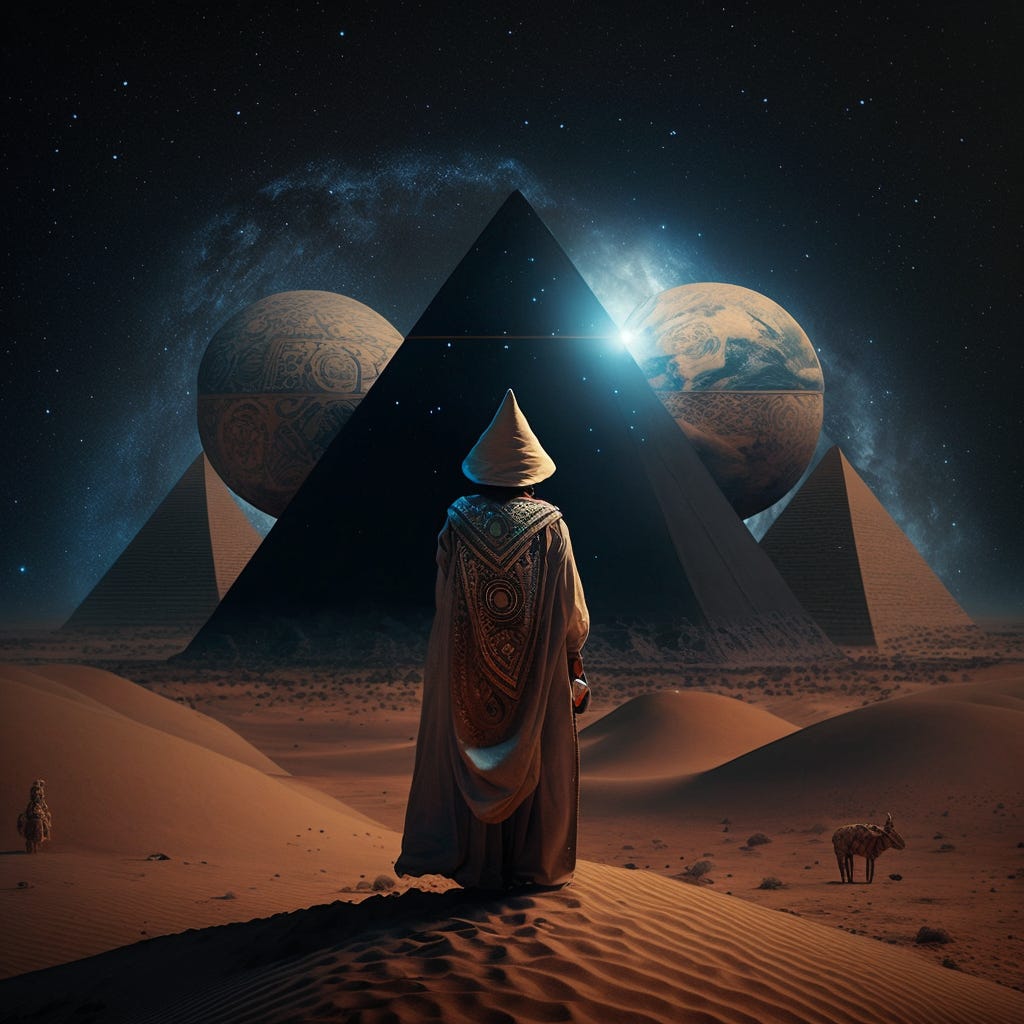
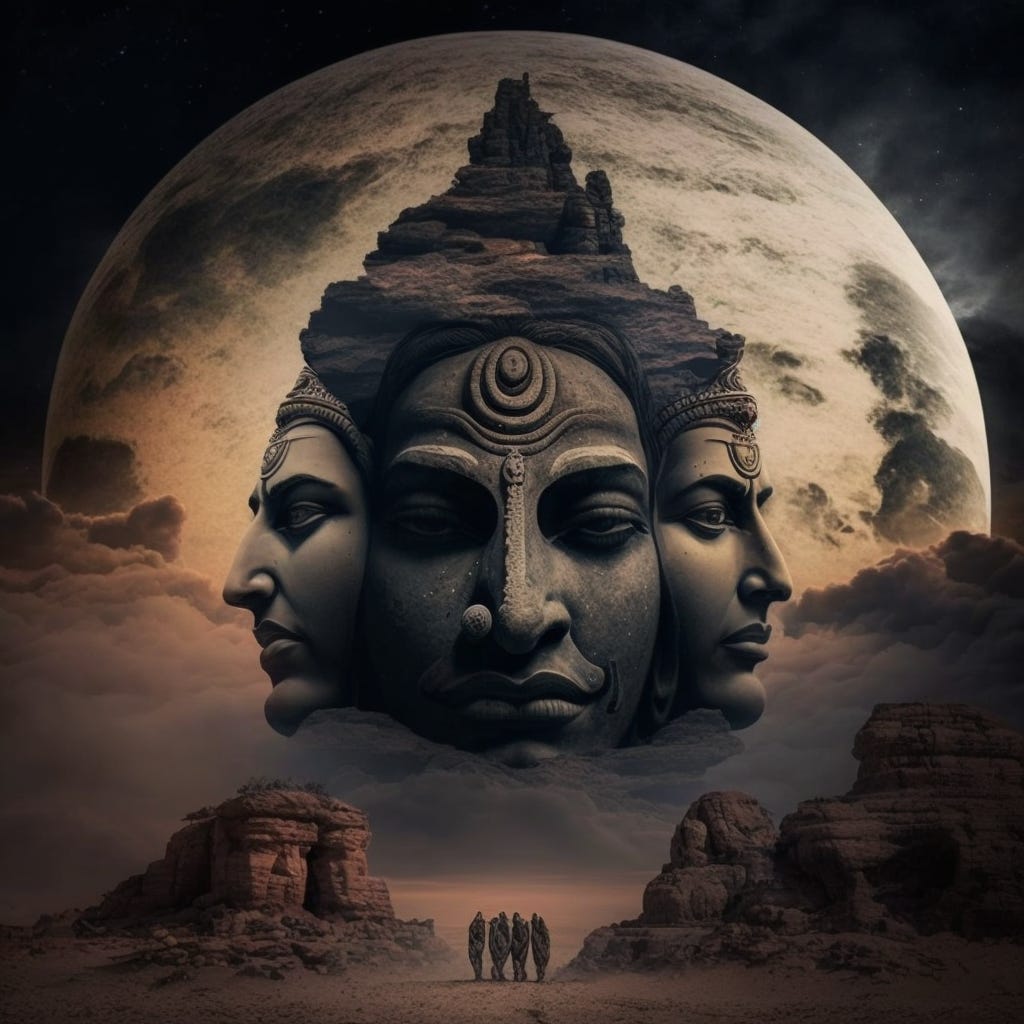
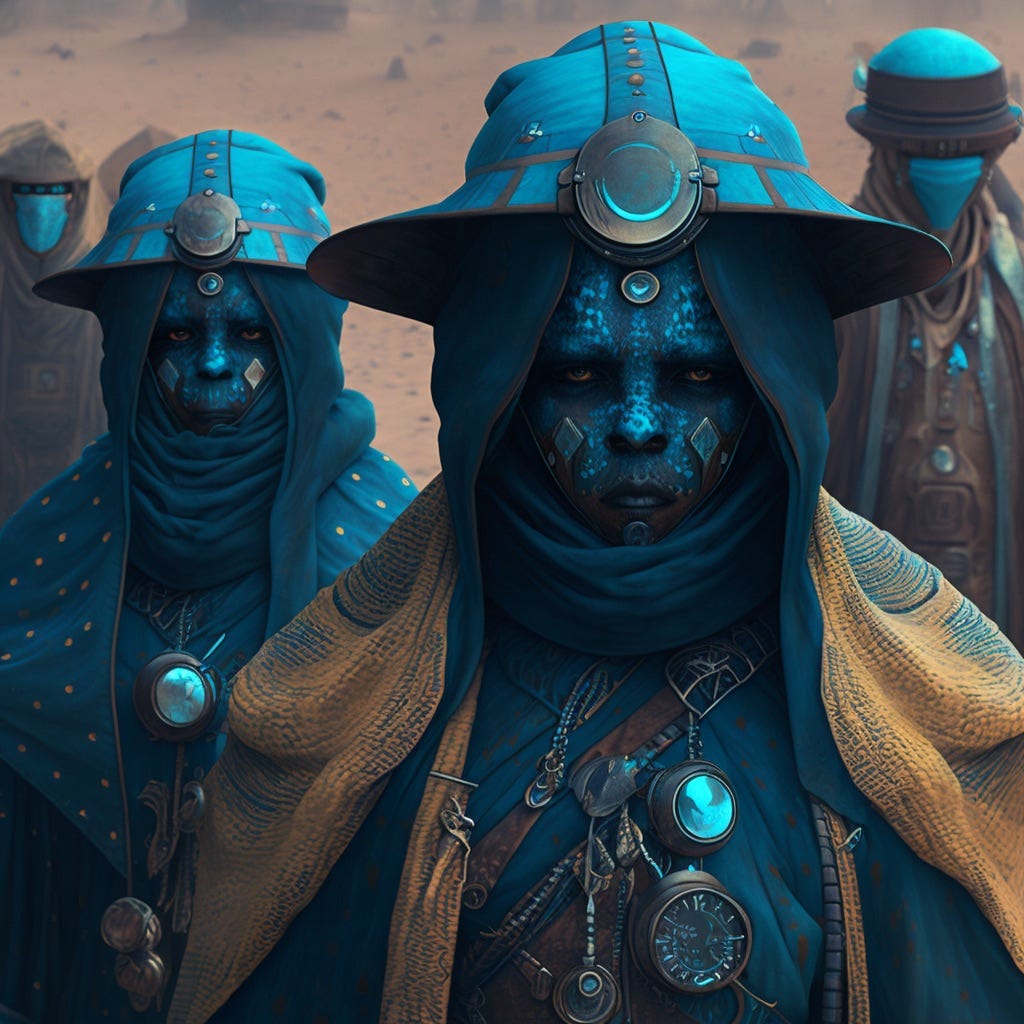


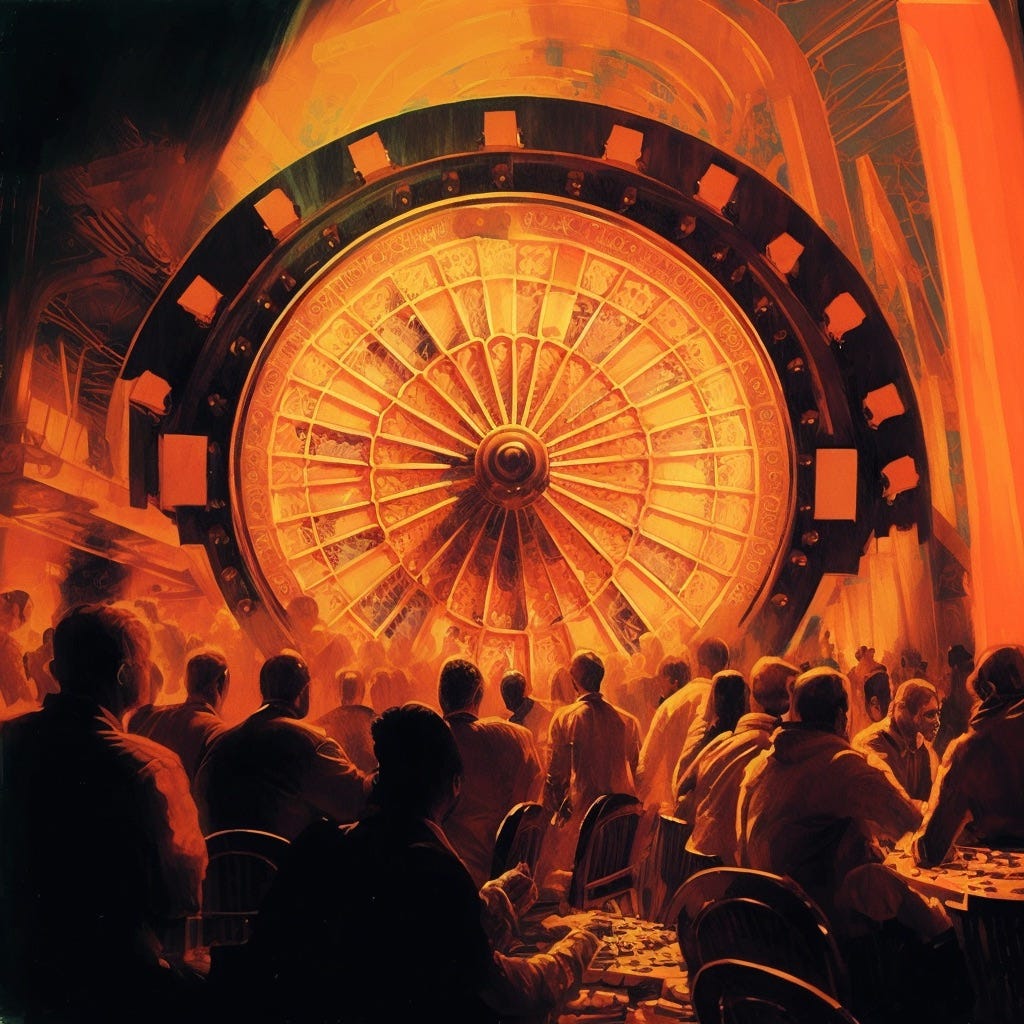



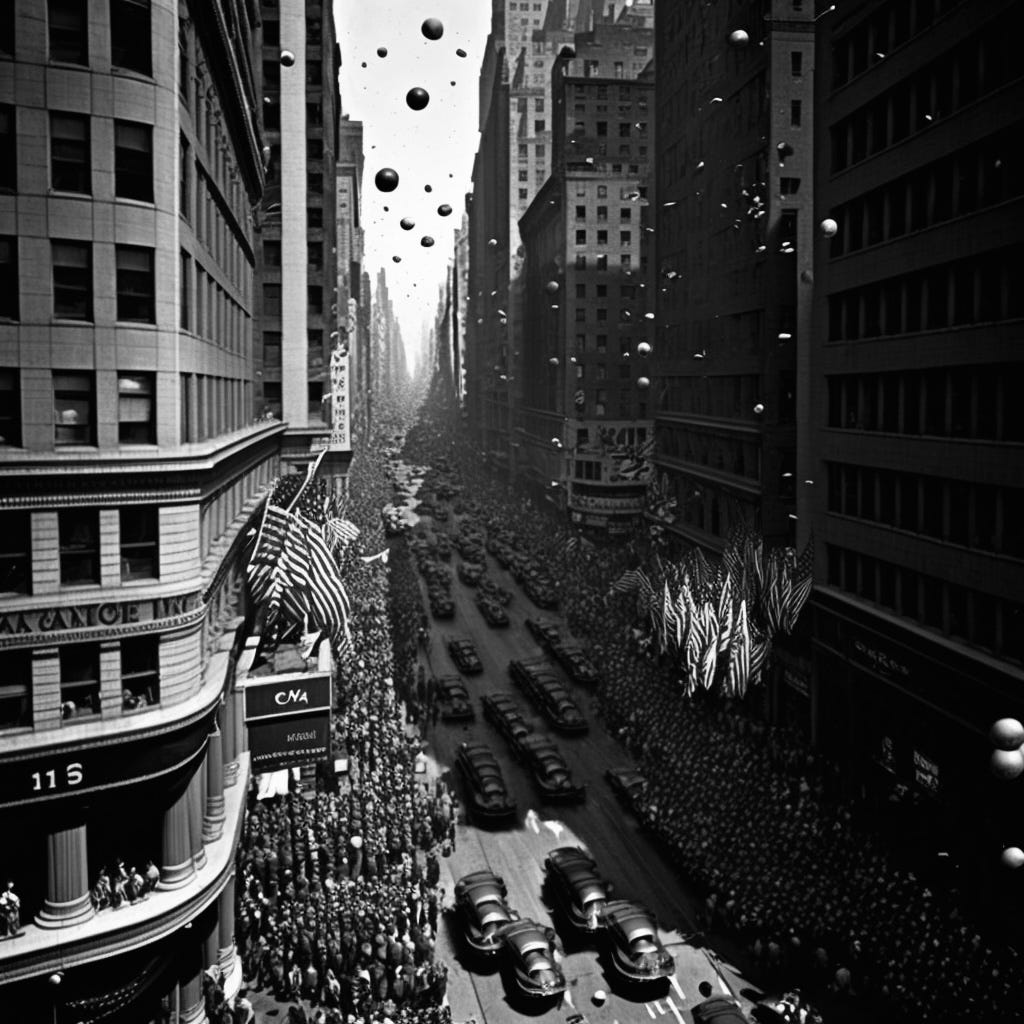
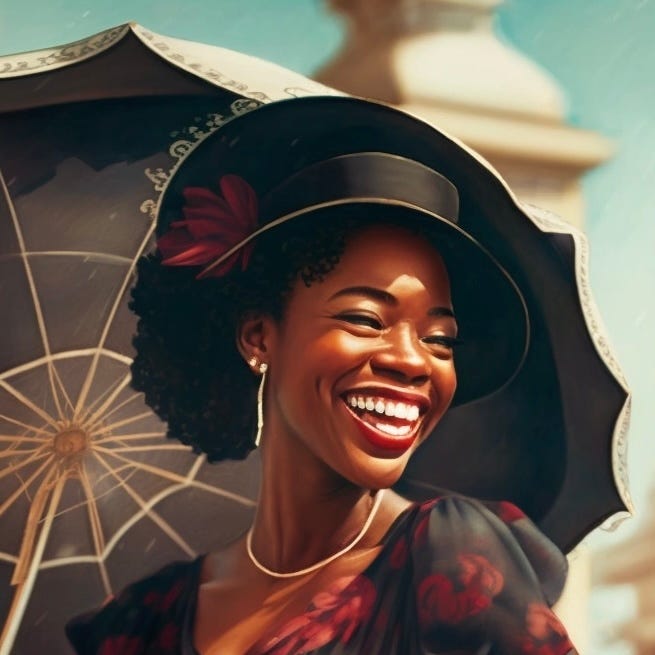



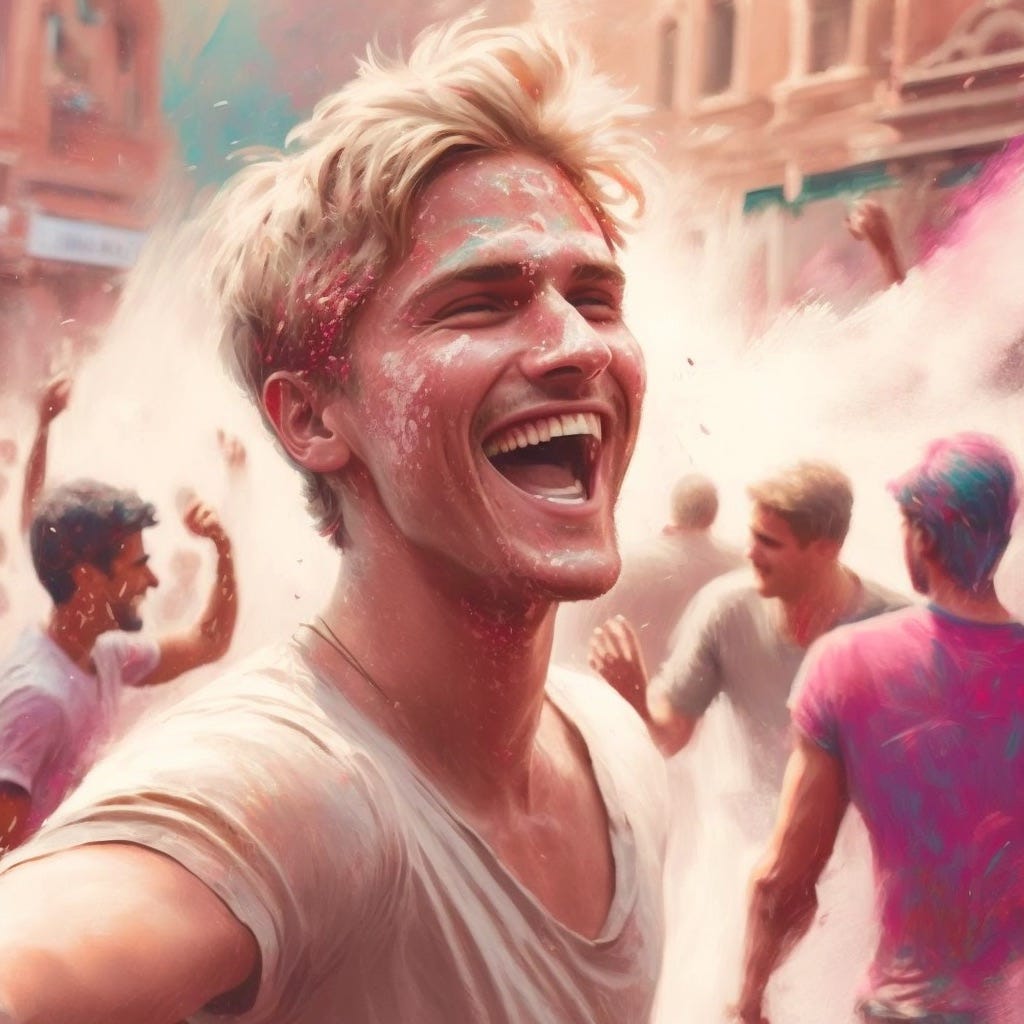
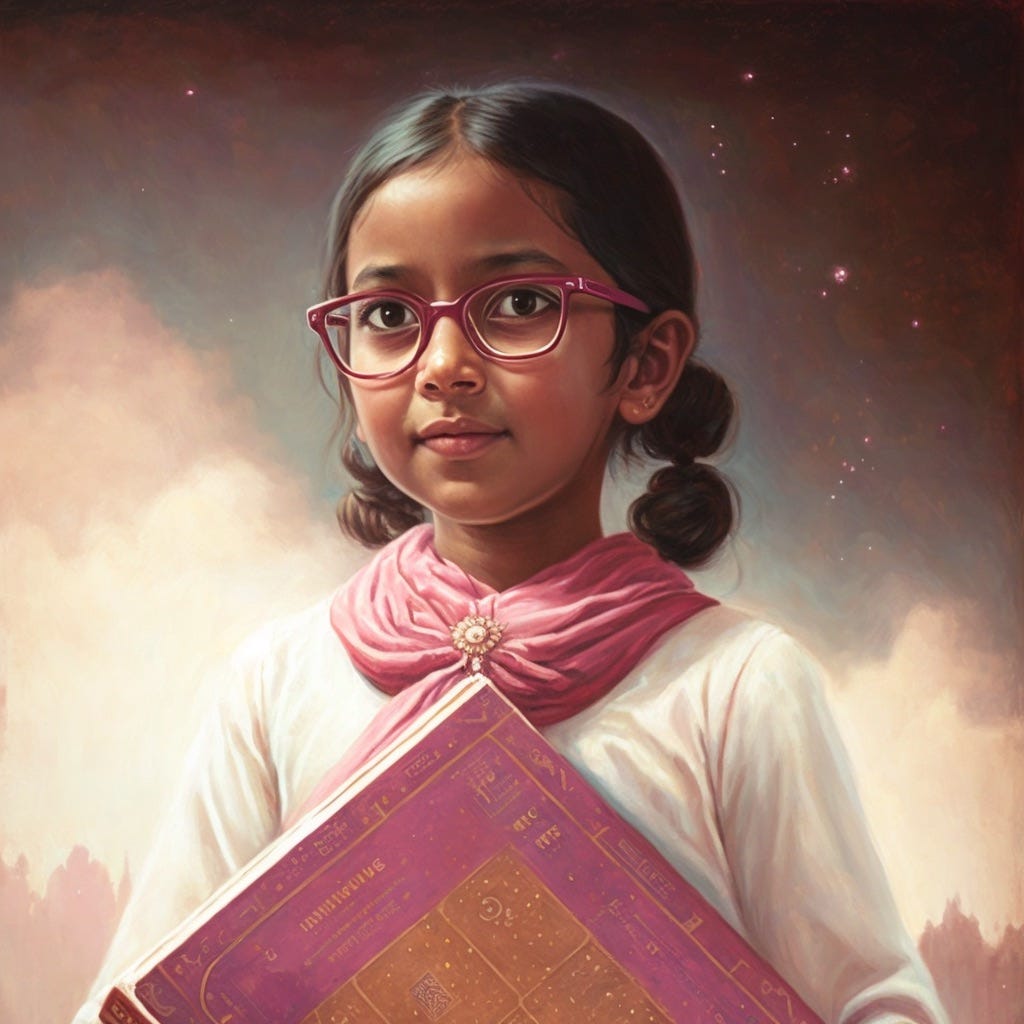
The section telling Gordon's story is an especially beautiful piece of prose. I also enjoyed the thought of Lord Krishna riding in a pumpkin chariot :-) Excited to see what other surprises await!